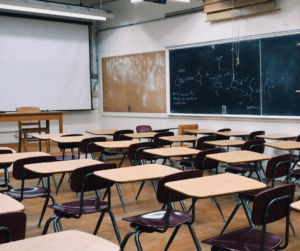Too-big class sizes. A shortage of math and reading specialists. A lack of capacity to help students work through pandemic-exacerbated mental health challenges. These are just some of the problems the 322,100 students at Chicago Public Schools (CPS) face every day.

It’s hard to argue that taking money away from the district will help improve any of these problems. Yet that is exactly what is happening, as companies and developers continue to drain money from a significantly underfunded public school system under the guise of “economic development.”
According to a Good Jobs First analysis of data from 2017-21, Chicago Public Schools lost over $189 million in funding due to corporate tax abatements given out by Cook County. That’s an average of $117 per student per year going to private enterprise rather than students.
That’s money that could have gone to any number of services to help students get proficient in reading and math, increase access to technology, make more schools accessible to wheelchairs or any other priority.
Even more troubling? During that same period, Cook County, which holds the authority and chose to abate the revenue, lost $81.7 million – still significant, but less than half the of the schools’ revenue it gave away.
It’s much easier to spend money when it’s not your own.
That we can account for so much foregone revenue is due to a somewhat-new government accounting rule, Governmental Accounting Standards Board Statement No. 77 (“GASB 77”), which requires many state and local governments to report in their annual financial reports how much money they give up every year as a result of economic development tax breaks (think waiving property taxes for a new Amazon warehouse). This requirement holds for governments that follow Generally Accepted Accounting Principles (GAAP). Interestingly, cities, counties, and school districts in Illinois are not actually required by law to follow this rule, but thankfully, many (like CPS) do.
The data shows a disturbing trend. In 2017, CPS gave up $37.5 million. By 2021, it was losing $44.5 million – a 20% jump.
Not only does the school board not have the power to stop the abatements –they also lose the most revenue as a result of the deals.
But it doesn’t have to be this way. In states including Florida, school revenue is shielded from economic development subsidies. That means if the county chooses to give property tax breaks, it won’t impact the schools’ portion of that money. Or school leaders could have a vote in each deal, as is the case of Louisiana.
For too long, Chicago students have paid the price for the failings of its leaders. But at least when it comes to economic development, they shouldn’t have to continue to subsidize companies looking to increase their profits.
Learn more about GASB Statement No. 77 here.